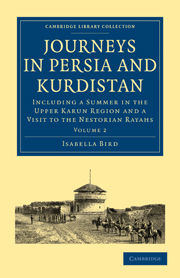 Journeys in Persia and Kurdistan
Journeys in Persia and Kurdistan Book contents
- Frontmatter
- LIST OF ILLUSTRATIONS
- LETTER XVI
- LETTER XVII
- LETTER XVIII
- LETTER XVIII (Continued)
- LETTER XIX
- LETTER XX
- LETTER XXI
- LETTER XXII
- LETTER XXIII
- LETTER XXIV
- LETTER XXV
- LETTER XXV (Continued)
- LETTER XXVI
- NOTES ON PROTESTANT MISSIONS IN URMI
- LETTER XXVII
- FAREWELL IMPRESSIONS OF PERSIA
- LETTER XXVIII
- LETTER XXIX
- LETTER XXIX (Continued)
- LETTER XXX
- LETTER XXXI
- LETTER XXXII
- LETTER XXXIII
- LETTER XXXIV
- LETTER XXXV
- APPENDIX A
- APPENDIX B
- INDEX
- Plate section
- Frontmatter
- LIST OF ILLUSTRATIONS
- LETTER XVI
- LETTER XVII
- LETTER XVIII
- LETTER XVIII (Continued)
- LETTER XIX
- LETTER XX
- LETTER XXI
- LETTER XXII
- LETTER XXIII
- LETTER XXIV
- LETTER XXV
- LETTER XXV (Continued)
- LETTER XXVI
- NOTES ON PROTESTANT MISSIONS IN URMI
- LETTER XXVII
- FAREWELL IMPRESSIONS OF PERSIA
- LETTER XXVIII
- LETTER XXIX
- LETTER XXIX (Continued)
- LETTER XXX
- LETTER XXXI
- LETTER XXXII
- LETTER XXXIII
- LETTER XXXIV
- LETTER XXXV
- APPENDIX A
- APPENDIX B
- INDEX
- Plate section
Summary
Hamadan, Aug. 28.
It was as I thought. The sowar sent with me was only a harmless peasant taken from the plough, mounted on his own horse, and provided with a Government gun. The poor fellow showed the “white feather” on the first march, and I was obliged to assert the “ascendency of race” and ride in front of him. The villagers at once set him down as an impostor, and refused him supplies, and as his horse could not keep up with mine, and the road presented no apparent perils, I dismissed him at the end of three days with a largesse which gladdened his heart. He did not know the way, and the afternoon I left Burujird he led me through ploughed fields and along roadless hillsides, till at the end of an hour I found myself close to the garden from which I started.
The early part of the first march is over great bare gravelly slopes without water. Then come irrigation and villages. The hills have been eaten nearly bare. Nothing remains but a yellow salvia and the beautiful Eryngium cœruleum. There, as in the Bakhtiari country, the people stack the Centaurea alata for winter fodder. The road is good, and except in two places a four-wheeled carriage could be driven over it at a trot.
The camping - ground was outside Deswali, an unwalled village of 106 houses, with extensive cultivated lands and a “well-to-do” aspect.
- Type
- Chapter
- Information
- Journeys in Persia and KurdistanIncluding a Summer in the Upper Karun Region and a Visit to the Nestorian Rayahs, pp. 134 - 147Publisher: Cambridge University PressPrint publication year: 2010First published in: 1891
